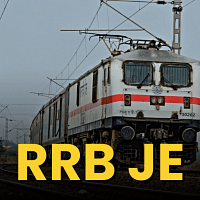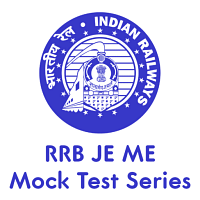Railways Exam > Railways Questions > If a P-pole alternator rotates N completes ro...
Start Learning for Free
If a P-pole alternator rotates N completes rotations, it produces ________ cycles of generated voltage. (As N in the number of rotations made per second)
- a)NP/2
- b)P/2N
- c)2N/P
- d)2NP
Correct answer is option 'A'. Can you explain this answer?
| FREE This question is part of | Download PDF Attempt this Test |
Verified Answer
If a P-pole alternator rotates N completes rotations, it produces ____...
We know that synchronous speed in an alternator is given by

Ns is synchronous speed in rpm
f is frequency or number of cycles
P is the number of poles
Given that, speed is N rps = 60 N rpm


Ns is synchronous speed in rpm
f is frequency or number of cycles
P is the number of poles
Given that, speed is N rps = 60 N rpm

Most Upvoted Answer
If a P-pole alternator rotates N completes rotations, it produces ____...
Explanation:
When a P-pole alternator rotates N complete rotations, it means that the rotor has made N revolutions. Here, P represents the number of poles on the rotor.
Understanding the concept:
An alternator consists of a rotor and a stator. The rotor rotates due to some external force, while the stator remains stationary. The rotor contains a certain number of poles (P), which are evenly distributed around its circumference.
Generated voltage:
As the rotor rotates, the magnetic field created by the rotor poles cuts across the stator windings, generating an induced voltage. This induced voltage is known as the generated voltage.
Relation between rotations and cycles of voltage:
- When the rotor makes one complete rotation, each pole passes by each stator winding once.
- Since the rotor has P poles, this means that P cycles of voltage are generated in one rotation of the rotor.
- Therefore, when the rotor makes N complete rotations, it produces N * P cycles of generated voltage.
Conversion to cycles per second:
The question states that N is the number of rotations made per second. To convert the cycles of voltage to cycles per second, we need to multiply by the frequency of rotation (f).
- Frequency (f) is the number of cycles per second.
- The frequency of rotation is equal to the number of rotations per second, which is N.
- Therefore, f = N cycles per second.
Final answer:
From the above reasoning, when the rotor makes N complete rotations, it produces N * P cycles of generated voltage.
Hence, the correct answer is option A: NP/2.
When a P-pole alternator rotates N complete rotations, it means that the rotor has made N revolutions. Here, P represents the number of poles on the rotor.
Understanding the concept:
An alternator consists of a rotor and a stator. The rotor rotates due to some external force, while the stator remains stationary. The rotor contains a certain number of poles (P), which are evenly distributed around its circumference.
Generated voltage:
As the rotor rotates, the magnetic field created by the rotor poles cuts across the stator windings, generating an induced voltage. This induced voltage is known as the generated voltage.
Relation between rotations and cycles of voltage:
- When the rotor makes one complete rotation, each pole passes by each stator winding once.
- Since the rotor has P poles, this means that P cycles of voltage are generated in one rotation of the rotor.
- Therefore, when the rotor makes N complete rotations, it produces N * P cycles of generated voltage.
Conversion to cycles per second:
The question states that N is the number of rotations made per second. To convert the cycles of voltage to cycles per second, we need to multiply by the frequency of rotation (f).
- Frequency (f) is the number of cycles per second.
- The frequency of rotation is equal to the number of rotations per second, which is N.
- Therefore, f = N cycles per second.
Final answer:
From the above reasoning, when the rotor makes N complete rotations, it produces N * P cycles of generated voltage.
Hence, the correct answer is option A: NP/2.
Attention Railways Students!
To make sure you are not studying endlessly, EduRev has designed Railways study material, with Structured Courses, Videos, & Test Series. Plus get personalized analysis, doubt solving and improvement plans to achieve a great score in Railways.

|
Explore Courses for Railways exam
|

|
If a P-pole alternator rotates N completes rotations, it produces ________ cycles of generated voltage. (As N in the number of rotations made per second)a)NP/2b)P/2Nc)2N/Pd)2NPCorrect answer is option 'A'. Can you explain this answer?
Question Description
If a P-pole alternator rotates N completes rotations, it produces ________ cycles of generated voltage. (As N in the number of rotations made per second)a)NP/2b)P/2Nc)2N/Pd)2NPCorrect answer is option 'A'. Can you explain this answer? for Railways 2024 is part of Railways preparation. The Question and answers have been prepared according to the Railways exam syllabus. Information about If a P-pole alternator rotates N completes rotations, it produces ________ cycles of generated voltage. (As N in the number of rotations made per second)a)NP/2b)P/2Nc)2N/Pd)2NPCorrect answer is option 'A'. Can you explain this answer? covers all topics & solutions for Railways 2024 Exam. Find important definitions, questions, meanings, examples, exercises and tests below for If a P-pole alternator rotates N completes rotations, it produces ________ cycles of generated voltage. (As N in the number of rotations made per second)a)NP/2b)P/2Nc)2N/Pd)2NPCorrect answer is option 'A'. Can you explain this answer?.
If a P-pole alternator rotates N completes rotations, it produces ________ cycles of generated voltage. (As N in the number of rotations made per second)a)NP/2b)P/2Nc)2N/Pd)2NPCorrect answer is option 'A'. Can you explain this answer? for Railways 2024 is part of Railways preparation. The Question and answers have been prepared according to the Railways exam syllabus. Information about If a P-pole alternator rotates N completes rotations, it produces ________ cycles of generated voltage. (As N in the number of rotations made per second)a)NP/2b)P/2Nc)2N/Pd)2NPCorrect answer is option 'A'. Can you explain this answer? covers all topics & solutions for Railways 2024 Exam. Find important definitions, questions, meanings, examples, exercises and tests below for If a P-pole alternator rotates N completes rotations, it produces ________ cycles of generated voltage. (As N in the number of rotations made per second)a)NP/2b)P/2Nc)2N/Pd)2NPCorrect answer is option 'A'. Can you explain this answer?.
Solutions for If a P-pole alternator rotates N completes rotations, it produces ________ cycles of generated voltage. (As N in the number of rotations made per second)a)NP/2b)P/2Nc)2N/Pd)2NPCorrect answer is option 'A'. Can you explain this answer? in English & in Hindi are available as part of our courses for Railways.
Download more important topics, notes, lectures and mock test series for Railways Exam by signing up for free.
Here you can find the meaning of If a P-pole alternator rotates N completes rotations, it produces ________ cycles of generated voltage. (As N in the number of rotations made per second)a)NP/2b)P/2Nc)2N/Pd)2NPCorrect answer is option 'A'. Can you explain this answer? defined & explained in the simplest way possible. Besides giving the explanation of
If a P-pole alternator rotates N completes rotations, it produces ________ cycles of generated voltage. (As N in the number of rotations made per second)a)NP/2b)P/2Nc)2N/Pd)2NPCorrect answer is option 'A'. Can you explain this answer?, a detailed solution for If a P-pole alternator rotates N completes rotations, it produces ________ cycles of generated voltage. (As N in the number of rotations made per second)a)NP/2b)P/2Nc)2N/Pd)2NPCorrect answer is option 'A'. Can you explain this answer? has been provided alongside types of If a P-pole alternator rotates N completes rotations, it produces ________ cycles of generated voltage. (As N in the number of rotations made per second)a)NP/2b)P/2Nc)2N/Pd)2NPCorrect answer is option 'A'. Can you explain this answer? theory, EduRev gives you an
ample number of questions to practice If a P-pole alternator rotates N completes rotations, it produces ________ cycles of generated voltage. (As N in the number of rotations made per second)a)NP/2b)P/2Nc)2N/Pd)2NPCorrect answer is option 'A'. Can you explain this answer? tests, examples and also practice Railways tests.

|
Explore Courses for Railways exam
|

|
Suggested Free Tests
Signup for Free!
Signup to see your scores go up within 7 days! Learn & Practice with 1000+ FREE Notes, Videos & Tests.






















